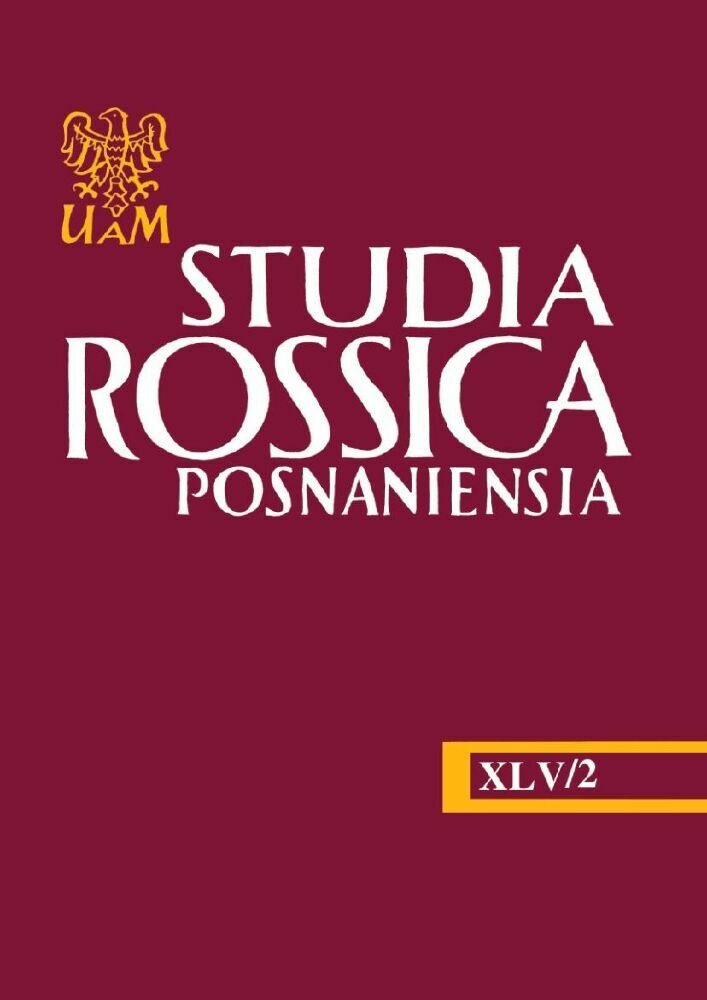Abstrakt
Many researchers of Lyudmila Petrushevskaya’s works draw attention to the irony which is the significant element of her prose, drama and poetry. It is important that the ironic principle manifests itself not only as an artistic technique but also as a philosophical aspect. Irony demonstrates the ambivalence of reality. On the one hand, it ridicules and profanes everything. On the other hand, irony gives the certitude of the ontological status of reality. We can see a good example of this function of irony in the novel Nas ukrali. Istoriya prestupleniy (2017). This novel shows the common features of Petrushevskaya’s works – the unity of ironic potential and language. In this case, language is not only the style but first of all the ontological element. This is why the language becomes almost a character in Petrushevskaya’s novel. Irony opens the vital potential of the linguistic personality. As a result, one of the heroes imitates foreign speech but doesn’t speak a foreign language. Irony also helps to reveal the ambivalent nature of life. It shows that our “umora” in Sanskrit and in ancient Indian is “humour” and “death”. So, the game and profanity not only reduce the status of the hero, the image, or the reader’s expectations but, first of all, fill the gap between words, ideas, feelings, and people.
Bibliografia
Binova, Galina. „Otironiikabsurdu: (kpoetikenovojvolny)”. Litterariahumanitas, 4, 1996, s. 379–389.
Gončarova-Grabovskaâ, Svetlana. „Sovremennaâ russkaâ dramaturgiâ: narušeniekanona”. NaučnyetrudykafedryrusskojliteraturyBGU, t. VII, 2012, s. 25–34.
Ivanova, Natalʹâ. „Dalʹše ty idešʹ odin. Proza: naličnostʹ i ličnostʹ”. Znamâ, 3, 2018. Web.07.09.2019. http://znamlit.ru/publication.php?id=6864.
Kozyreva, Natalʹâ. „Smehovoe načalo v hudožestvennoj literature: filosofsko-antropologičeskie izmereniâ”. Teoriâ i praktika obŝestvennogo razvitiâ, 4, 2015, s. 116–118.
Lejdermann, Naum, Mark Lipoveckij. Russkaâ literatura XX veka (1950–1990). T. 2. Moskva, Aka-demiâ, 2013.
Petruševskaâ, Lûdmila. Nas ukrali. Istoriâ prestuplenij. Moskva, Izdatelʹstvo „È”, 2017.
Plehanova, Irina. Principy hudožestvennoj igry Petruševskoj. Moskva, Flinta, 2019.
Tûpa, Valerij. „Hudožestvennostʹ”. Vvedenie v literaturovedenie. Literaturnoe proizvedenie: Osnovnye ponâtiâ i terminy. Red. Lidiâ Černec. Moskva, Izdatelʹstvo Vysšaâ škola, Izdatelʹskij centr „Akademiâ”, 2000, s. 463–482.
Licencja
PRACE PUBLIKOWANE W CZASOPIŚMIE DOSTĘPNE SĄ NA LICENCJI CREATIVE COMMONS:
Uznanie autorstwa-Użycie niekomercyjne-Na tych samych warunkach 4.0 Międzynarodowe.
Autorzy tekstów przyjętych do publikacji w czasopiśmie „Studia Rossica Posnaniensia” są zobowiązani do wypełnienia, podpisania i odesłania na adres redakcji umowy o udzielenie nieodpłatnej licencji do utworów, z zobowiązaniem do udzielania sublicencji Creative Commons.
Zgodnie z umową, autorzy tekstów opublikowanych w czasopiśmie “Studia Rossica Posnaniensia” udzielają Uniwersytetowi im. Adama Mickiewicza w Poznaniu niewyłącznej i nieodpłatnej licencji oraz zezwalają na użycie sublicencji Attribution-NonCommercial-ShareAlike 4.0 International (CC BY-NC-SA 4.0).
Autorzy zachowują prawa do dalszego, swobodnego rozporządzania utworem.
Autorzy, którzy wykorzystują w swoim tekście cudze utwory (np. ilustracje, fotografie) proszeni są o dostarczenie do redakcji czasopisma zgody na publikację.
Użytkownicy internetu uprawnieni są do korzystania z utworów opublikowanych po 2015 roku “Studia Rossica Posnaniensia” tylko w celach niekomercyjnych, pod następującymi warunkami:
https://creativecommons.org/licenses/by-nc-sa/4.0/
Uniwersytet im. Adama Mickiewicza w Poznaniu zachowuje prawo do czasopisma jako całości (układ, forma graficzna, tytuł, projekt okładki, logo itp.).

